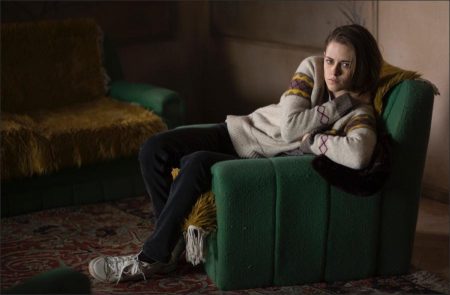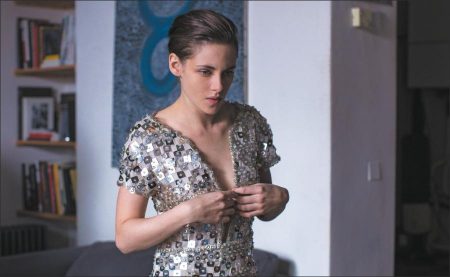
It’s been already three months since the sudden death of her 27-year-old twin brother Lewis from a congenital malformation of the heart, and Maureen, a young fashionista, assistant to a celebrity woman and a capable medium, still hasn’t made any contact with him. Spending her time between high profile fashion establishments and the abandoned Lewis’ house in Paris, Maureen is silently battling with the gut-wrenching grief and sorrow, while at the same time, looking for a sign from her deceased brother after an oath taken between the twins.
Aloof, disoriented and still mourning, wraithlike Maureen attuned to the ethereal realm, is inevitably caught between this world and the spiritual, always looking for portals and a sign that would prove her brother right, however, in vain. Unexpectedly, as the days pass by swiftly and the random apparitions become more frequent, Maureen will start to receive strange text messages from an unknown sender who seems to know a lot about her, but in the end, if there is still no sign of the beloved Lewis, is there any point in waiting?
Personal Shopper is a 2016 supernatural psychological thriller film written and directed by Olivier Assayas. The film stars Kristen Stewart as a young American woman in Paris who works as a personal shopper for a celebrity and tries to communicate with her deceased twin brother.
An international co-production between Belgium, Czech Republic, France and Germany, the film was selected to compete for the Palme d’Or at the 2016 Cannes Film Festival. At Cannes, Assayas shared the Best Director Award with Cristian Mungiu, who directed Graduation. The film was released on 14 December 2016 in France and 10 March 2017 in the United States. The film received positive reviews from critics, with particular praise for Stewart’s performance.

Film Review for Personal Shopper
After winning a Cesar for ‘Clouds of Sils Maria,’ Kristen Stewart reteams with director Olivier Assayas to play yet another beleaguered celebrity slave.
There’s a certain perverse genius to unveiling a ghost movie at Cannes that relies on the audience to deliver the “boos” as the final credits roll, although one doubts that’s quite what Olivier Assayas was going for with his peculiar “Personal Shopper.” The wildly unconventional study of a young American woman going through a spiritual crisis — in more ways than one — this reunion between Kristen Stewart and the director who gave her one of her best-ever roles in 2014’s “Clouds of Sils Maria” is a broken, but never boring mix of spine-tingling horror story, dreary workplace drama and elliptical identity search, likely to go down as one of the most divisive films of Stewart’s career.
Apart from a handful of ultra-violent slasher movies (such as “High Tension” and “Them”), contemporary French cinema seldom ventures into the realm of horror. Not that ultra-cinema-savvy critic-turned-helmer Assayas seems particularly worried about such traditions. “Personal Shopper” bears about as much in common with any other ghost movie you may have seen as the director’s now-20-year-old “Irma Vep” does classic vampire movies (which was sort of the point, centering on a remake of silent classic “Les Vampires”).

Assayas’ flip dismissal of basic genre-movie standards will surely confuse younger viewers seeking relatively conventional thrills, especially those who tune in because they heard the “Twilight” star takes her top off (although that particular selling point didn’t exactly work for “On the Road” either). For more discerning grown-ups, however, there’s certainly enough here to haunt — often in ways that have more to do with subtext and psychology than the computer-generated ghost that surfaces in the movie’s scarier scenes.
At first glance, Stewart’s character, Maureen Cartwright, seems to be cut from the same cloth as the celebrity assistant she played in “Sils Maria.” In that film, part of the fun was getting to watch one of Hollywood’s most famous young stars play-acting the stress of having to juggle menial chores for her demanding diva boss. Still, while Maureen belongs to the same system of disposable satellites drawn into the orbit of needy tabloid idols, her job couldn’t be more different.
Frankly, it’s hard to imagine anyone in Paris with a better gig as we watch Maureen ride her motorcycle from one haute couture designer’s atelier to the next, picking out gowns for single-name star Kyra to wear — the only rule being that she’s not allowed to try them on herself. While being a personal shopper offers little in the way of personal satisfaction, the work is so cushy that it actually leaves time for Maureen to moonlight as a medium, which is where things tend to get really weird.
In the opening scene, Maureen arrives at a big empty mansion to hold a séance, and though she doesn’t spot the menacing specter hovering in the corner of the living room, Assayas ensures that we do. It will take some time before the movie gets around to revealing what Maureen was doing in that house — although it never bothers to explain what she, an American, is doing in Paris. Turns out, her twin brother, Lewis, also lived in France. Actually, it would be more accurate to say he died in France, which hasn’t been an easy thing for Maureen to accept. They both had weak hearts, and the deal was, whoever died first would send the other a sign from the other side, so she — and we — spend the movie waiting for just such a message. And because Assayas has already indicated that ghosts are not only real, but potentially malevolent, that creates real suspense.
The message arrives, as messages tend to do, via cell phone during an already harried go-fer run to London. Considering that Maureen will spend the better part of 20 minutes texting with an unknown (and potentially undead) caller, it’s kind of a clever conceit that she spends the conversation juggling her most glamorous assignment. But it’s also a bummer that Stewart has to act so much of the movie on her lonesome, avoiding calls from her long-distance boyfriend and doing research via YouTube (where she watches videos about abstract painter Hilma af Klimt and French novelist Victor Hugo, who both communed with the beyond). Stewart is a terrific actress, her brittle exterior barely masking whatever tempest she or her characters are battling underneath, and here, the unpredictability of what she may do next is heightened by the fact that there are no rules for what can happen.
Soon, Maureen is taking orders from the mysterious presence on the other end of her cell phone, who starts to feed her lines not that far from those of the postmodern serial killer in “Scream.” (Yes, she likes scary movies.) Whoever it is leaves a key for her to a hotel room, encouraging Maureen to test her phobias, which evidently involve trying on Kyra’s clothes and then masturbating in her boss’s bed. Maureen not-so-secretly despises her boss, though her feelings on this — like those involving her dead brother, or toward the fashion industry in which she’s made so many high-ranking connections — are only partly articulated.
Though the film is told in strictly chronological order, making sense of it feels like trying to reassemble a broken mirror. Losing Lewis really messed up Maureen, and in her meaningless job as a celebrity slave, she’s starting to lose herself as well. She could quit, though Assayas comes up with a far more surprising way to liberate Maureen of her employment duties, whisking her away to faraway Oman, for a scene that’s as disembodied from the rest of the film as the Iraq-set opening of “The Exorcist” feels from all the reality-grounded horror that follows. (Stewart’s first of two topless scenes, in which she goes in for a heart sonogram, could be a nod to the far-grimmer carotid angiography Regan endures in that film.) Between this and “Sils Maria,” Stewart has suffered enough for imaginary stars, we can only hope she goes easy on her own assistants.
Personal Shopper (2017)
Directed by: Olivier Assayas
Starring: Kristen Stewart, Lars Eidinger, Sigrid Bouaziz, Anders Danielsen Lie, Nora von Waldstätten, Benjamin Biolay, Audrey Bonnet, Aurélia Petit
Screenplay by: Olivier Assayas
Production Design by: François-Renaud Labarthe
Cinematography by: Yorick Le Saux
Film Editing by: Marion Monnier
Costume Design by: Jürgen Doering
Set Decoration by: Martin Kurel
MPAA Rating: R for some language, sexuality, nudity and a bloody violent image.
Distributed by: Les Films du Losange
Release Date: March 10, 2017 (United States), December 14, 2016 (France)



